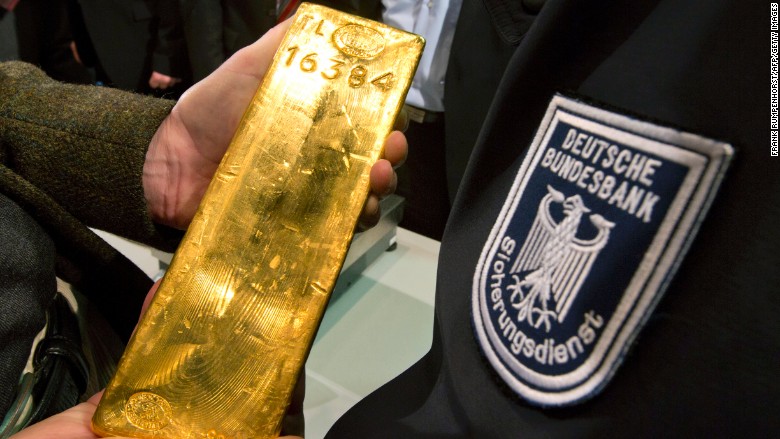
Germany's gold has come home.
The country's central bank has completed a transfer of gold bars worth $13 billion from New York to Frankfurt, part of a plan to repatriate roughly half the reserves it keeps abroad.
Germany has been bringing gold home from New York and Paris since 2013. So far, 642 tons has been transferred.
With the latest transfer, the central bank has shifted a total of 330 tons of gold that had been stored with the New York Federal Reserve, deep in a subterranean vault that rests on the bedrock of Manhattan Island. The bank won't say how it moves the gold.
The plan will be completed when a final 100 tons is returned from Paris.
The central bank says it is bringing the gold home to help build public "trust and confidence."
But it's also a recognition that times have changed: Germans are no longer worried about preventing their gold reserves from falling under Soviet control -- a real fear during the Cold War.
And the central bank no longer needs to keep gold in Paris as a protective measure that would allow it to quickly exchange international currency in an emergency. Both countries use the euro.

In the wake of World War II, Germany gradually rebuilt its decimated gold reserves. As its economy strengthened, it converted the U.S. dollars that paid for its exports to gold and stored the proceeds in foreign vaults.
Fears of Soviet invasion kept the reserves abroad even after the value of the dollar was decoupled from the price of gold.
Related: Gold was supposed to soar if Trump won. It didn't
In recent years, rumors and conspiracy theories have circulated in Germany about its foreign gold reserves. Some fringe observers questioned whether they had been lost or otherwise compromised.
The issue eventually spilled over into mainstream politics, and the German Federal Court of Auditors asked for an inspection of foreign gold reserves in 2012.
Related: Germany's trade surplus hits record high
The central bank mounted a defense, saying it received annual updates from foreign central banks where the gold was being stored. It said that the "integrity, reputation and security of these foreign depositories are beyond reproach."
The following year, however, the central bank announced that it would bring half its reserves home to Frankfurt.
Germany will store its remaining reserves in London and New York, where they could be quickly exchanged for pounds or dollars in an economic emergency.


